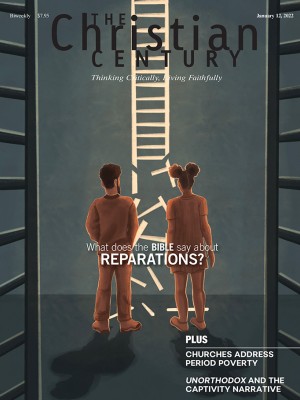January 23, Epiphany 3 (Nehemiah 8:1-3, 5-6, 8-10; Psalm 19; 1 Corinthians 12:12-31a; Luke 4:14-21)
The word of God is living and active; it meets us where we are.
A friend of mine, a Lutheran pastor, once attended an event at a private Christian high school. First a student brought out an American flag. Everyone put their hands over their hearts and said the Pledge of Allegiance. My friend followed suit. Next a student brought out the Christian flag, and another pledge was spoken. My friend stood respectfully, hand over his heart, mouthing words he didn’t know. Finally some students entered the room pushing a cart loaded with a giant Bible. As the assembled crowd prepared to say yet another pledge, my friend’s hand slipped to his side, his mouth firmly closed. He couldn’t even pretend to follow along.
“I wasn’t sure what such a pledge would mean,” he said later. He wondered if the pledge was to a specific translation, to a method of interpretation, or, worse yet, to the giant Bible itself—a golden calf in book form. It all was just a little bit much, even for a Lutheran.
Read our latest issue or browse back issues.
The Lutheran tradition, of which we are both a part, is second to none in its reliance on scripture. The “word alone” is the basis for our faith and our assurance of salvation. We take the Bible too seriously to cast it in amber. It isn’t just a book for us; the word is alive. We aren’t alone in this theology—many Christians confess to a similar understanding. The collected readings for this third Sunday after the Epiphany exemplify what it means to believe in the living word.
Written word is the focus of the Nehemiah reading. Nehemiah and Ezra tell the story of the Hebrew people’s return to Jerusalem after generations of exile. Rebuilding the physical structures of the temple and the city wall are obvious priorities. And another construction project is underway: Ezra and the priests are assembling what will become the Torah. Until then, sacred text has been accessible to common people only aurally. As the story opens men, women, and “everyone who could understand” gather at Jerusalem’s gate to listen to this new scripture read aloud.
Their first response is to weep. Nehemiah doesn’t give a reason but also will not allow grief the final say. Even when the Bible was new it needed interpretation. Ezra, Nehemiah, and the Levites remind the people: God’s word meets us where we are. Just past our lectionary selection the story ends with a hopeful coda: the people understand the word and go home rejoicing. They share what they have with those in need.
The embodied Word is the focus of the Gospel selection from Luke. As in Nehemiah, the reading of scripture takes center stage. Jesus’ ministry has just begun. Not yet accompanied by disciples, he has been teaching in the synagogues, and on this day he goes to Nazareth to worship in his hometown. Jesus receives the Isaiah scroll and reads essentially a synopsis of his own ministry. His concluding sermon is simple: “Today this scripture has been fulfilled in your hearing.”
The word translated as “today” occurs at crucial points in Luke. “This day a son is born” (2:11). “Today you will be with me in paradise” (23:43). Luke makes it clear that Jesus’ work is immediate and relevant. The gospel is not given in a vacuum; scripture responds to human need. It isn’t just in John’s Gospel that the word becomes flesh.
The word living in and through believers and their communities is 1 Corinthians’ focus. In previous chapters Paul describes the problems of a particular community that could be any of our churches. There are divisions among the people; sinful activity is permitted and even encouraged; the poor and the needy are getting left behind. Paul relies on a metaphor both to chastise the community and to offer a way back to faithfulness.
The metaphor of the body was commonly used in Greek and Roman oratory, usually to emphasize unity under hierarchy. But in 1 Corinthians Paul changes a key point of its meaning. Unity is still important, but rigid hierarchy is replaced with interdependence and even special concern for the weak and less respectable. The very people singled out for healing and salvation in Isaiah become indispensable to the Christian community. The gospel cannot be Good News only to a privileged class. It must be spoken through the lives of all who believe and bear fruit in their communities.
Bibles come in all sizes, from pocket editions to tomes so grand they are even displayed on carts. Many remain unopened and uninterpreted, honored in the abstract but otherwise forgotten, the word within them just as inaccessible to people today as it was in ancient times. It has been said that the believer is the only Bible many people will ever read. As people rooted in the word, I wonder if our lives pledge such allegiance?
Many a preacher begins sermons with Psalm 19:14, “Let the words of my mouth and the meditation of my heart be acceptable to you, O Lord, my rock and my redeemer.” Perhaps we should reflect on verses 1–3. “The heavens,” the psalmist writes, “are telling the glory of God; and the firmament proclaims his handiwork”—yet there is “no speech, nor are there words.” The living word is not just text but must be embodied, meeting God’s people today in their deepest need. Our hands belong not over our hearts but at work for our neighbor, if we would have the word take flesh in us.






